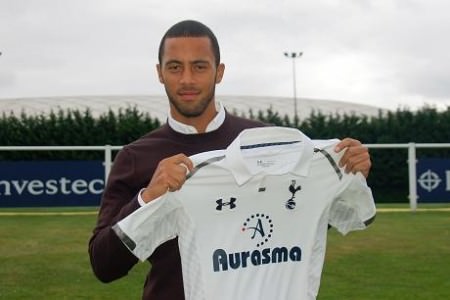A strong attacking start from Andre Villas-Boas’ squad has disguised the defensive flaws in the 35-year-old’s methods at Tottenham, where his patient and gradual style has led to a relaxed approach from the team, most notably at the cost of conceding late goals.
Whilst it could be said that this is down to his 4-2-3-1 formation, the clear missing piece of the puzzle has been identified as the former Fulham midfielder Moussa Dembele. The Belgium international moved to Tottenham in the summer window for £15 million, and since moving to the club, Spurs have won every Premier League game he has started.
In all competitions, Dembele has played six full games, including two Europa League matches. In these games, Tottenham have conceded five goals, four in the second half of the games.
Whilst Dembele obviously helps Villas-Boas implement his ideology at Spurs, his absence has led to weaknesses going forward and, as a result, conceding goals has become more of an obvious problem. Most notably, the weeknight defeat to Norwich at Carrow Road was suffered after two late goals were allowed by Spurs, the first goal being a replica of the one which Hughton’s side scored in September at White Hart Lane (in the exact same minute, too (83′)).
The defensive problems have also been echoed by the lone-striker approach of Villas-Boas, which has seen Jermain Defoe struggle to win aerial challenges against the opposition’s defence, following Brad Friedel repeatedly kicking the ball down the field. The shortcomings of AVB’s high-line have been keenly felt, as the American goalkeeper has little option but to boot the ball across the pitch, due to a lack of viable options. It comes as no surprise to see that Defoe has an aerial duels success rate of only 40%. Altogether, this results in Tottenham giving the ball away cheaply to rivals, helping them create chances for themselves.
The lack of squad rotation and huge fatigue levels are clearly a problem for Villas-Boas, too, whose side has conceded 7 goals in the final 10 minutes of games. In 11 games where Tottenham have conceded this season, six games have contained late goals. Not only this but a huge 17 goals have been let in by the Tottenham defence in all competitions, meaning that a staggering 41% of goals have been scored against Spurs from 80 minutes onwards. Furthermore, 14 out of 17 goals scored by Tottenham’s opposition have been scored in the second half of games, 82%.
Overall, with the absence of Moussa Dembele and the lack of depth in Tottenham’s squad, the London side will continue to face late tests against opposing teams. But, when their defence is on top-form, as shown by their landmark win against Manchester United, the Spurs side could get used to a dominating period if their pace, intelligence and possessive play is utilised by Andre Villas-Boas.
All of the stats from this article have been taken from the Opta Stats Centre at EPLIndex.com – Subscribe Now (Includes author privileges!) Check out our new Top Stats feature on the Stats Centre which allows you to compare all players in the league & read about new additions to the stats centre.




